

Home/Procedures & Treatments/Dental Implants
Home/Procedures & Treatments/Dental Implants
Dental implants are a revolutionary tooth-replacement option made up of a biocompatible post that is gently inserted in the jawbone and then topped with a custom-fabricated dental crown. With dental implants from Dr. Daniel Lauer, you can permanently replace missing teeth with results that look and feel natural. Implants eliminate many of the problems associated with other teeth replacement options, such as traditional dentures. A dental implant actually becomes part of your mouth, serving the same function as your natural tooth. This effective treatment option can ultimately improve the function of your teeth while enhancing the appearance of your smile. Dr. Lauer is a specialist in Implantology and has completed years of advanced training in these procedures, giving him the enhanced skills and experience necessary to provide the best possible outcomes. He utilizes some of the most advanced dental implant technology available, including state-of-the-art Guided Implant Surgery and precise digital mapping to give you the most natural-fitting implant possible. Our dental implant procedures can help you achieve your goals with exceptional results. Please contact our Jupiter-based practice to schedule a dental implant consultation with Dr. Lauer. He will be happy to answer all of your questions.

“I Think Dr. Lauer is A Terrific Guy & Dentist”
With dental implants, you can replace missing teeth without the negative effects associated with other teeth replacement treatments. Implants offer a number of benefits and advantages for patients who have lost one or more natural teeth, including:
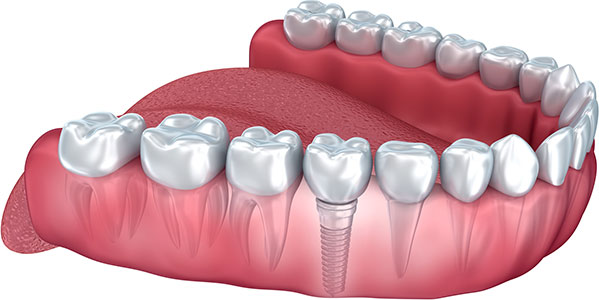 Dental implants can be used to replace a single tooth or multiple teeth. They can also be helpful for patients who would like to add support and stability to traditional bridges and dentures. There are a number of dental implant options that can help you meet your individual needs.
Dental implants can be used to replace a single tooth or multiple teeth. They can also be helpful for patients who would like to add support and stability to traditional bridges and dentures. There are a number of dental implant options that can help you meet your individual needs.
During your initial consultation with Dr. Lauer, he will talk with you about your goals and give you a comprehensive oral evaluation to determine if you are a good candidate for dental implants. Candidates for this procedure typically include:
For patients who may not completely meet the factors for candidacy listed above, there are alternatives to a full dental implant procedure which may be helpful, as well as treatments to potentially make them a good candidate, such as bone grafting and ridge augmentation. Dr. Lauer will go over all of your options at your initial consultation.
“Excellent” is my rating on Dr. Lauer for my implant procedure. From the first visit I felt comfortable with him and his wonderful staff, and I liked the fact that he has state-of-the-art equipment and super clean rooms. At the time of my procedure he was gentle and responsive to my needs, while performing his job with utmost efficiency. Good teamwork between him and surgical assistant. The procedure was pain-free and even afterwards I was pain-free the remainder of the day and night, and days following. Dr. Lauer possesses a genuine caring quality, even calling (personally) at the end of the day to check up on me. I was very impressed, as doctors don’t take the time for that these days. I would highly recommend Dr. Lauer for an implant procedure, and would not hesitate going to him for any other procedures he performs.” –Connie J.
Dental implants can be customized to accommodate a variety of teeth replacement needs. Whether a patient is only missing one tooth or needs an entire arch replaced, Dr. Lauer is highly experienced in a number of dental implant techniques to provide the best possible outcome. Learn more below about the different types of dental implant procedures available.
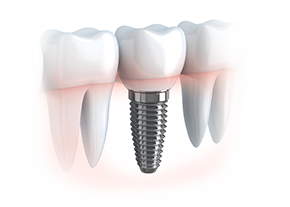
Patients needing to replace a single missing tooth can receive an individual dental implant for an incredibly lifelike result. For this procedure, Dr. Lauer will place the titanium post into the space where the tooth root once was. As this gradually fuses to your bone over a few months, it becomes a solid foundation for the restoration. Once your implant is securely a part of your mouth, a permanent dental crown will be attached to the post by your general dentist for a natural-looking and -functioning tooth replacement.
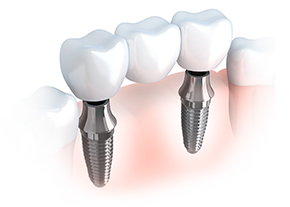
Implant-supported bridges can be used to replace multiple missing teeth next to each other. This procedure often involves placing two dental implants into the jaw, which will support a bridge of at least three replacement teeth. With an implant bridge, every single tooth does not need to have its own implant, but the teeth replacement still achieves a secure foundation.
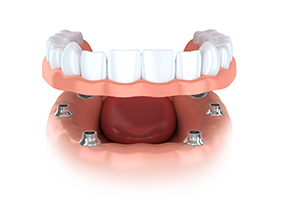
For those suffering from an entire arch of missing or severely damaged teeth, an implant-supported denture can provide life-changing results. A full mouth teeth replacement (or New Teeth in a Day), often using the All-on-4® treatment concept, can replace one or both arches of teeth in a single day, restoring the form and function of a patient’s teeth without the inconveniences associated with removable dentures.
A successful dental implant procedure begins with thorough preparation. Dr. Lauer will conduct a comprehensive evaluation of your oral health, which will include digital imaging and a detailed review of your medical history. He will also ensure that your jawbone is strong enough to support implants and identify any underlying conditions that need to be addressed beforehand.
If you have insufficient bone density, Dr. Lauer may recommend a bone graft to enhance the implant site (discussed in more detail below). Additionally, habits like smoking should be reduced or eliminated, as they can impact healing and implant success. Dr. Lauer will give you personalized instructions to follow before surgery, such as guidelines on medications, diet, and oral hygiene to optimize your readiness for the procedure.
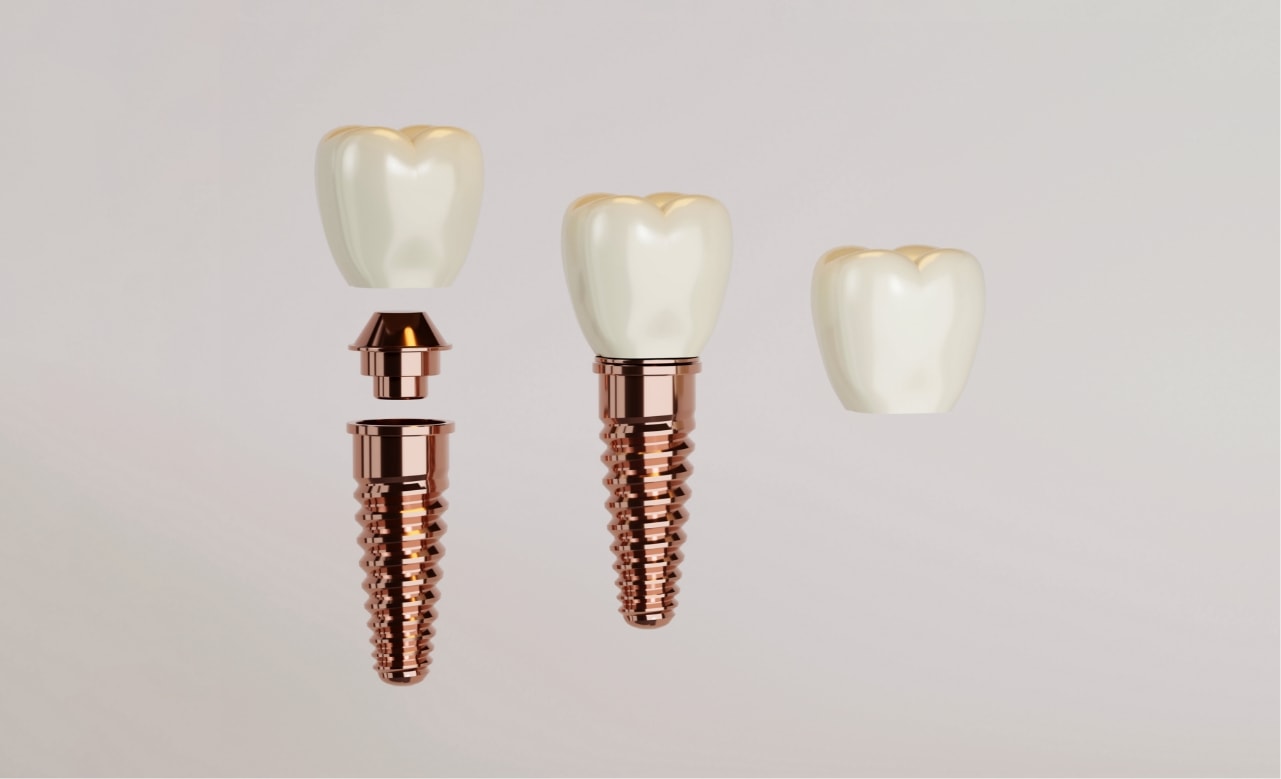
Dental implants are durable titanium artificial tooth roots that are connected to the jawbone. Dr. Lauer will place the implant inside the gum in the area of the missing tooth, and it will be anchored to the bone. Over the next few months, the implant will fuse itself to the bone – actually becoming a part of your mouth, like a natural tooth. During this process, a temporary crown can sometimes be placed on top of the implant for greater comfort and aesthetic improvement. Implant placement is typically performed with a local anesthetic applied to the treatment areas. You can also opt for one of our sedation dentistry techniques in order to feel as relaxed as possible during treatment.
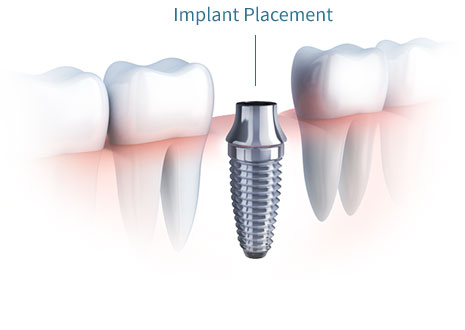
Dr. Lauer will examine the progress of the implant during the fusion process to determine when it is properly fused to the jawbone. Once this has occurred, and the area around the implant has healed, you are ready to be fitted for a permanent dental crown from your general dentist. When your dental crown has been created, your dentist will attach it to the implant and the procedure will be complete. The permanent crown is custom-made to provide you with the most functionally and aesthetically perfect fit possible. The result? A brand new tooth (or set of teeth) that looks and feels like natural teeth. In fact, you may not be able to tell the difference between the implants and your actual teeth!
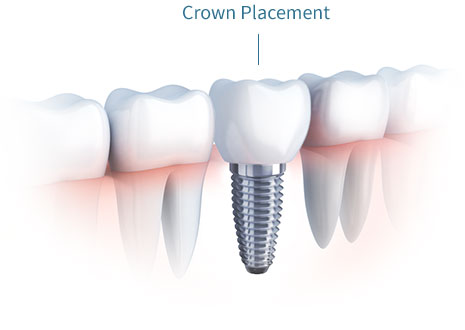
Not every patient will require bone grafting before dental implants. Bone grafting is a dental technique that is utilized for patients with insufficient jawbone density to help them regenerate lost bone. The procedure helps restore the structural integrity of the jaw to properly support dental implants. If there is an inadequate amount of bone where the titanium implant post is placed, there is a higher risk of implant failure. By using bone grafts to rebuild the jawbone, Dr. Lauer can maximize the long-term success of your dental implant surgery. Additionally, beyond offering a strong foundation for implants, bone grafting can improve eating and speaking functionality.

The recovery process after dental implant surgery varies depending on the number of implants placed and whether additional procedures, such as bone grafting, were performed. Many patients experience mild tenderness, swelling, and bruising in the first few days, but these symptoms can typically be managed with over-the-counter pain medication.
To encourage proper healing, be sure to closely follow Dr. Lauer’s aftercare instructions. In addition to maintaining proper oral hygiene, avoiding the surgical site, and refraining from strenuous activities for a few days, you will likely be advised to adhere to a soft food diet for about six weeks. If any questions arise as you heal, feel free to contact our friendly team.
When placed by a qualified professional and properly cared for by the patient, dental implants can last for decades, if not a lifetime. However, since restorations are more prone to wear and tear over the years, the artificial teeth may eventually need to be replaced.

Selecting a qualified dental implant specialist is crucial for the safety and success of your procedure. You want to find a communicative and skilled specialist that you trust to effectively restore your oral function. When evaluating potential dental professionals, there are multiple factors to consider, including:
The average cost of dental implants is about $3,500-3,600, which includes the surgical placement of the implant post. To complete the entire dental implant process—from any preliminary work that is needed to placing the implant and final restoration—you can expect to pay about $3,500-5,000. More personalized details can be provided during your consultation, when Dr. Lauer has had the opportunity to perform an oral exam and begin planning the specifics of your procedure. Learn more about what factors into dental implant cost.
Since insurance policies are typically designed to cover routine care, basic treatments, and emergencies, dental implants are often excluded as a covered benefit. However, the lowest-priced alternative to dental implants is often covered. Our staff can help patients navigate their insurance benefits to determine if their insurance provider will contribute to their total dental implants cost. In addition, to help make dental implants an affordable option for anyone, Precision Periodontics & Implant Dentistry offers dental financing options to divide the total cost into smaller, more manageable payments.
Dental implants are considered one of the best options for replacing missing teeth, but we understand they are not always a realistic option for everyone. Alternative solutions that may be more appropriate for some patients include traditional dentures and bridges. For those who are not good candidates for several dental implants, Dr. Lauer may recommend a multi-tooth prosthesis that is anchored to the jawbone by approximately four to six strategically placed implants, such as in the implant denture procedure. During your consultation, Dr. Lauer will go over all of your options to ensure you are able to make an informed decision about your choice of teeth replacement.
A dental implant to replace a single missing tooth holds a number of advantages over options such as dental bridges. In addition to acting as a natural tooth, a dental implant will not affect the health and structure of surrounding teeth and gums, and it will not require the grinding down of adjacent teeth. A dental implant can also better preserve bone, and it ultimately becomes a permanent part of your mouth, just like a natural tooth. Dental implants decrease the potential for receding gums around the new tooth; they are easier to keep clean; and they are more aesthetically pleasing than other treatment options. For some patients, an implant-supported bridge may be recommended.
As a board-certified periodontist, Dr. Lauer is proficient in caring for the structures that support the teeth, and he only offers patients the safest solutions for their needs—dental implants being one of them. In fact, the dental implants used today have been around for over 30 years. The technology is the best it has ever been and continues to advance. When the procedure is performed by an experienced professional, and candidates are carefully chosen, dental implants are considered a safe replacement for missing teeth. Since implant posts are typically composed of titanium, a biocompatible material, patients can look forward to long-lasting benefits from their dental implants.
Dental implants are designed to look, feel, and function as much like natural teeth as possible, and they can generally also be cared for in the same way. Maintaining good oral hygiene by brushing, using a Waterpik, and flossing regularly along with attending your regularly scheduled professional dental cleanings is typically sufficient to keep your mouth healthy and your implants in good condition. That said, in order to prevent your restorations from accruing unnecessary wear and tear, there are some steps you can take. Being mindful when eating hard or pitted foods (such as nuts or cherries) and not using your teeth as tools can help protect your implants over the long-term. If you have a history of bruxism (teeth grinding), you should talk to your dentist about the possibility of getting a custom-fitted nightguard.
Dental implant failure occurs when an implant does not properly fuse with the jawbone, resulting in instability. Infection or other complications that inhibit osseointegration can occur as a result of a number of factors, including smoking, vaping, poor oral hygiene, periodontal disease, and inadequate bone density. It is crucial for implant patients to carefully adhere to their dentist or periodontist’s aftercare instructions. Fortunately, implant failure is exceedingly uncommon, especially when the implant is placed by a qualified professional. Dr. Lauer specializes in implantology and he uses advanced digital imaging software to precisely map out the placement of each implant post. He also carefully assesses each patient’s candidacy for implants prior to recommending the procedure, ensuring the highest possible likelihood of success.
Dental implants are usually placed under local anesthesia, so the procedure itself should be relatively painless. Furthermore, Dr. Lauer is a highly qualified and experienced periodontist, and he has refined his techniques over the years to optimize patient comfort and accelerate recovery speeds. That said, he does offer several advanced sedation dentistry options for patients who would like to feel as relaxed and comfortable as possible during surgery. For the first few days after the implant is placed, there may be some minor swelling and tenderness around the incision sites. Any post-surgical discomfort can typically be managed effectively with over-the-counter pain medication. Once the gums have healed from surgery, your implant should look and feel just like a natural part of your mouth.
Common side effects after dental implant surgery include minor bleeding, bruising, and swelling around the new implant. Fortunately, these conditions are typically temporary, lasting a few days to a week. To optimize your chances of a successful implant procedure it is important to maintain good oral hygiene, take all of your medications as prescribed, and contact your dentist immediately if you notice anything unusual.
Medicare does not typically cover dental implants or other dental care. However, some Medicare Advantage plans may offer dental coverage. We recommend contacting your insurance provider to find out if dental implants might be covered by your plan.
If you have any questions about dental implants, such as the dental implant cost or which procedure is right for you, please contact Precision Periodontics & Implant Dentistry to schedule a consultation with Dr. Lauer.